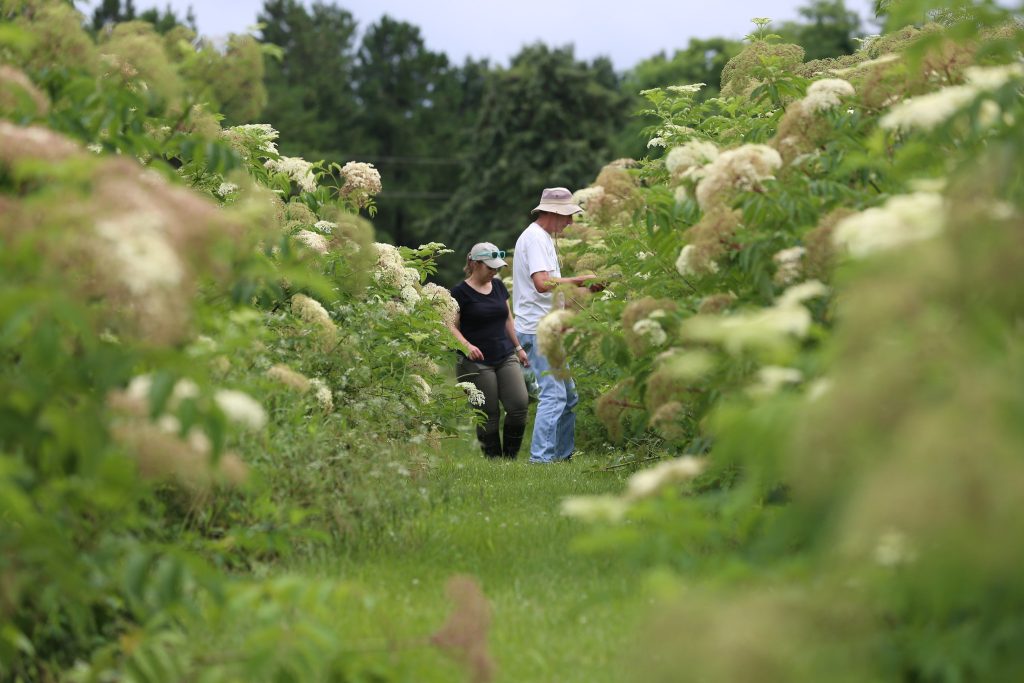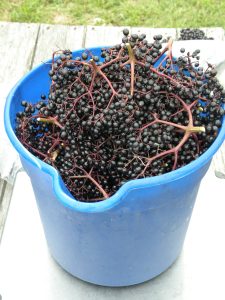Published on
Updated on

This story appears in our MU CAFNR/Agricultural Experiment Station Research Magazine.
Andrew Thomas has big plans for a small berry.
Thomas, a research assistant professor in the Division of Plant Science and Technology in the College of Agriculture, Food and Natural Resources (CAFNR) at the University of Missouri, has received a Specialty Crop Research Initiative (SCRI) grant from the U.S. Department of Agriculture for the project, Moving American Elderberry into Mainstream Production and Processing. The award is for $5,345,255 over a four-year period.
Elderberry is a native plant found all over the Midwest and eastern United States. Thomas, who has conducted elderberry research for 25 years at CAFNR’s Southwest Research, Extension and Education Center (SW-REEC) in Mount Vernon, Mo., has found that the demand for elderberry products has increased over the last several years.
“The industry has really continued to grow, especially during the pandemic,” Thomas said. “Elderberry-based dietary supplement product sales have skyrocketed because of their well-known health benefits. Elderberry is full of antioxidants that can help boost your immune system.
“Elderberry production in Missouri has also started to boom. It has surpassed blackberries and strawberries in the state.”
Thomas said there are several moving parts to this project, including horticulture, plant breeding, food science, human health, mechanical harvest, economics and a strong outreach component. The foundation of the project is running a south-to-north trial, planting different varieties in different regions.

“I always get questions asking, for example, if an Oklahoma variety will grow well in Missouri or even in Canada,” Thomas said. “My answer has always been ‘I don’t know,’ but now we will have the resources to find out.”
Thomas said there are already several aspects of the project that have begun. The team has planted different varieties in five different locations: at the Kerr Center for Sustainable Agriculture in Poteau, Okla.; the Savanna Institute in southwest Wisconsin and in Champaign, Ill.; the MU SW-REEC in Mount Vernon, Mo.; and the MU Horticulture and Agroforestry Research Farm in New Franklin, Mo. These sites will eventually host field days and events to educate the public about elderberries and the industry.
Other aspects of the research include basic breeding of elderberry plants, which is being led by Ron Revord, assistant research professor at the MU Center for Agroforestry. Since elderberry production is relatively new and the plant is native, very little breeding has previously been done.
“Elderberry is not advanced at all in terms of cultivar development,” said Thomas. “We are jump-starting the project with a very basic, foundational breeding program, while concurrently using modern technologies to set the stage for much more sophisticated genetic advancements down the line.
“We expect to plant thousands of seedlings from our program at various locations. Our goal is to identify and eventually release superior cultivars for elderberry growers in Missouri and elsewhere.”
In addition to cultivar development, Thomas said the elderberry genome is also being mapped.
“It’s vital that we do all we can to understand the complete genetic picture of elderberry,” Thomas said.
Other parts of the project include working with Jianfeng Zhou, assistant professor in the Division of Plant Science and Technology, on mechanical harvest equipment. Thomas said that elderberry harvest is very labor intensive. The group at MU is researching ways to make that process go more smoothly.
Economists at the University of Minnesota and MU will be studying production costs, as well as the current elderberry market and the market potential. They are sending out surveys to track that information.
Food scientists at MU, including Kiruba Krishnaswamy, assistant professor in food science, and North Carolina State University are working together on understanding the processing of elderberries into juice and pomace. In their labs they will develop methods to spray-dry juice to make a powdered “super food” that can be easily added to products such as protein shakes and bars.
“The spray-dry juice will allow us to develop a more shelf-stable product that will also be more versatile,” Thomas said.
Researchers in the MU School of Medicine will be studying elderberry’s potential benefit to the aging brain using mouse models. The food science group will be pre-preparing elderberry products that will go into the diets of mice. Researchers will be looking at dementia, memory loss and other aspects of the aging brain to determine if elderberry supplements can maintain and even improve brain health as people grow older.
“Another significant component of the project is outreach to elderberry stakeholders, from farmers to processors to marketers,” Thomas said. “We’re developing an online curriculum as well so that we can share all that we’re learning with the public. We’ve launched our website (elderberry.missouri.edu), too, where people can go to stay up-to-date with all that we’re doing.”
The project involves collaborations with many researchers across numerous disciplines at MU, but also with institutions across the country. Additional collaborators include the University of Minnesota, Savanna Institute, Kerr Center, North Carolina State University, Penn State and Lincoln University.
Thomas led a meeting in Columbia in June with grant project partners, as well as other elderberry stakeholders. The goal of the meeting was to share updates with other team members and to present the project to stakeholders from the elderberry industry. Thomas said the plan is to host these meetings annually, with an international symposium to be held in 2025.
“I am so fortunate not only to have connections with a team of incredible researchers and extension faculty at MU, but also to have terrific connections with experts at other institutions,” said Thomas. “Without them none of this would be possible.”